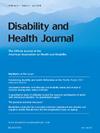Fetal alcohol syndrome and population level health care usage in British Columbia, Canada
IF 3.7
2区 医学
Q1 HEALTH CARE SCIENCES & SERVICES
引用次数: 0
Abstract
Background
The literature indicates that youth with Fetal Alcohol Syndrome (FAS) may experience high rates of both physical and mental health issues compared to youth without FAS. However, there is little population level health data available for youth with FAS, particularly for youth transitioning from pediatric to adult healthcare services.
Objective
The objective of this study was to compare health care usage of youth with Fetal Alcohol Syndrome to youth without any intellectual/developmental disabilities (IDD).
Methods
This study used a retrospective cohort design and population-level administrative health data to examine five aspects of health care usage by youth with FAS and compare them to youth with no intellectual/developmental disability. The variables were medically required dental care, visits to emergency departments and visits for mental health issues. In addition, the study stratified data by age groups and examined the difference between youth aged 15–19 and youth aged 20–24.
Results
Youth with FAS had higher adjusted odds of medically required dental care, visits to the emergency department and visits for anxiety/depression, psychotic illnesses and substance use disorders compared to youth with no IDD. The odds of a medically required dental visit, emergency department visit and visit for psychotic illness or substance use disorder were also higher for youth aged 20–24 years compared to youth aged 15–19 years.
Conclusions
These findings indicate that youth with FAS require urgent attention for each of the medically-related variables included in this study. The need for attention to their health care needs may increase as these youth transition from pediatric to adult health care services.
加拿大不列颠哥伦比亚省的胎儿酒精综合症和人口医疗保健使用情况。
背景:文献表明,与没有胎儿酒精综合症(FAS)的青少年相比,患有胎儿酒精综合症(FAS)的青少年在身体和心理健康方面的问题发生率都很高。然而,有关胎儿酒精综合症青少年的人群健康数据却很少,尤其是有关从儿科医疗服务过渡到成人医疗服务的青少年的数据:本研究旨在比较患有胎儿酒精综合症的青少年与没有任何智力/发育障碍(IDD)的青少年在医疗保健方面的使用情况:本研究采用回顾性队列设计和人口级行政健康数据,对患有胎儿酒精综合症的青少年使用医疗保健服务的五个方面进行了调查,并将其与没有智力/发育障碍的青少年进行了比较。这些变量包括医疗必需的牙科护理、急诊就诊和因精神健康问题就诊。此外,该研究还按年龄组对数据进行了分层,并检查了 15-19 岁青少年与 20-24 岁青少年之间的差异:与没有 IDD 的青少年相比,患有 FAS 的青少年需要接受牙科医疗护理、到急诊室就诊以及因焦虑/抑郁、精神病和药物使用障碍就诊的调整后几率更高。与 15-19 岁的青少年相比,20-24 岁的青少年需要接受牙科医疗护理、去急诊室就诊以及因精神病或药物使用障碍就诊的几率也更高:这些研究结果表明,患有 FAS 的青少年需要紧急关注本研究中与医疗相关的每一个变量。随着这些青少年从儿科医疗服务过渡到成人医疗服务,他们对医疗保健需求的关注可能会增加。
本文章由计算机程序翻译,如有差异,请以英文原文为准。
求助全文
约1分钟内获得全文
求助全文
来源期刊

Disability and Health Journal
HEALTH CARE SCIENCES & SERVICES-PUBLIC, ENVIRONMENTAL & OCCUPATIONAL HEALTH
CiteScore
7.50
自引率
6.70%
发文量
134
审稿时长
34 days
期刊介绍:
Disability and Health Journal is a scientific, scholarly, and multidisciplinary journal for reporting original contributions that advance knowledge in disability and health. Topics may be related to global health, quality of life, and specific health conditions as they relate to disability. Such contributions include:
• Reports of empirical research on the characteristics of persons with disabilities, environment, health outcomes, and determinants of health
• Reports of empirical research on the Systematic or other evidence-based reviews and tightly conceived theoretical interpretations of research literature
• Reports of empirical research on the Evaluative research on new interventions, technologies, and programs
• Reports of empirical research on the Reports on issues or policies affecting the health and/or quality of life for persons with disabilities, using a scientific base.
 求助内容:
求助内容: 应助结果提醒方式:
应助结果提醒方式:


